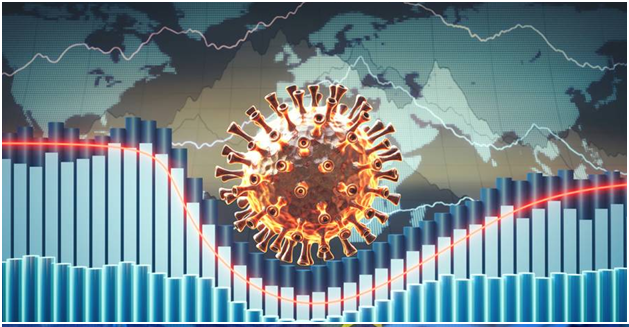
The first drug to treat Covid-19 is on the way, and vaccine manufacturers are distributing booster shots to wealthier nations. The next stage of the pandemic will make stock picking more difficult for investors.
The success of Merck & Co.‘s oral antiviral medication in a clinical study has reversed the stock market’s dynamic, impacting on shares of Pfizer Inc., Moderna Inc., and BioNTech SE, the firms that created the most powerful vaccines.
A successful deployment of a Covid-19 pill 19 months into the pandemic might hasten and broaden the world’s recovery, opening up a multitude of stock market trading and investment opportunities.
Traders consider the following equities as potential winners and losers:
Several firms around the world have stated that they are attempting to do what Merck appears to have accomplished: develop a simple medication that minimises the risk of major illness or death in patients infected with the coronavirus. For the most part, their efforts have been in vain, and their stocks have slid back following temporary price rises.
Red Hill Biopharma Ltd., a small Israeli biotech, stated on Oct. 4 that its experimental oral medication showed promise in aiding hospitalised patients. Only 251 persons were included in the research; Red Hill had previously stated that the medicine had failed to show an effect in a larger group of patients. The corporation is in talks with regulators about the next steps.
“The Covid medicines are a great supplement to the vaccines,” Shane Oliver, chief of investment strategy at AMP Capital Investors Ltd. in Sydney, stated. He stated that they might lower the demand for more expensive treatments like intravenous medications.
Another small business, Synairgen Plc of the United Kingdom, was a favourite among investors last year, with shares surging 2,520 percent on hopes for an inhalation treatment for Covid-19. This year, the stock has dropped 2%. It, too, anticipates late-stage study results by the end of the year.
The release of Merck’s molnupiravir tablet, combined with the possibility that the epidemic will diminish further, is already weighing on vaccine companies’ valuations.
After a 434 percent increase last year, Moderna’s stock price has nearly tripled in 2021. The stock’s inclusion in the S&P 500 in July pushed it to new highs and pushed it past analysts’ price expectations.
Despite this, it is now valued at 11 times the anticipated earnings dropped from 147 in July 2020. For the first time in more than 4 months, the current selloff brought the stock back in line with analysts’ 12-month estimates.
Despite tripling this year, Pfizer’s German partner BioNTech’s stock is even cheaper at 5.9 times earnings.
In a report dated Oct. 5, Morgan Stanley strategist Matthew Harrison stated, “Vaccines remain the key preventative measure and biggest market prospect.”
Still, the size of that market is unknown: Annual coronavirus vaccine sales are expected to range from $3 billion to $30 billion in the long run, according to Harrison. On both Pfizer and Moderna, he has a same weight rating.
If new vaccines from Novavax Inc., Sanofi, or Valneva SE succeed, and if mix-and-match boosting shows to be beneficial, the vaccine leaders may lose market share. The Food and Drug Administration in the United States is analysing the findings of a study of adults who got extra doses of various vaccines than their first jabs.
Pfizer, as well as,BioNTech are pursuing FDA permission for their vaccines to be used on children aged 5 to 11, while Moderna is also testing its vaccine on children.
In Asia, keep an eye on companies like Shanghai Fosun Pharmaceutical Group Co., which has a partnership to distribute BioNTech and Pfizer’s vaccine in Greater China, and South Korea’s SK Bioscience Company, which is also an AstraZeneca Plc local production partner.
Covid’s pill could displace pricey infusions that must be done in a clinic, such as monoclonal antibody therapies from GlaxoSmithKline Plc, Regeneron Pharmaceuticals Inc.,partner Vir Biotechnology Inc, Gilead Sciences Inc., andEli Lilly & Company.
In an October 1 research note, Goldman Sachs Group Inc. analyst Chris Shibutani said that new oral antivirals “may open up a bigger population to Covid-19 therapy in a true outpatient context.”
The use of Covid testing kits may be reduced as a result of ongoing vaccination and the possibility of a treatment.
“A reduced pandemic reaction as a result of Covid will result in less demand for asymptomatic test notably quick testing,” said Tycho Peterson, a strategist at JPMorgan Chase & Co.
Beyond the symptomatic and PCR testing, Goldman strategists predict that the market for quick Covid tests will “crumble” in 2022 to less than $200 million. DiaSorinSpA, Qiagen NV, and Abbott Laboratories, which make those fast tests known as antigen tests, have all fallen from their September highs.
In the United States, Orasure Technologies Inc., Quidel Corp., and Abbott will be scrutinised. Traders in Asia are keeping an eye on Biolidics Ltd., Metropolis Healthcare Ltd., Dr. LalPathLabs Ltd.,Thyrocare Technologies Ltd., and Sugentech Inc.
Eurofins Scientific SE, a lab operator, and lab equipment providers Sartorius AG, Sartorius Stedim Biotech, Fluidigm Corp., and Tecan Group AG are among the companies to keep an eye on.

Leave a Reply